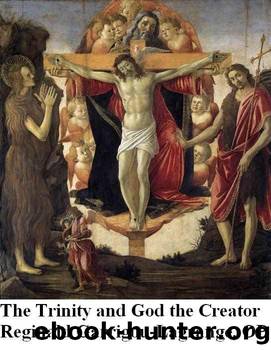The Trinity and God the Creator by Garrigou-Lagrange OP Reginald

Author:Garrigou-Lagrange OP, Reginald
Language: eng
Format: epub
Publisher: Veritatis Splendor Publications
Published: 2012-01-11T00:00:00+00:00
* * *
CHAPTER XIX: QUESTION 45 THE EMANATION OF THINGS
THIS question is divided into two parts of four questions each. The first part, including the first four questions, is a search for the real definition of creation. It begins with the nominal definition of creation and considers 1. the terminus a quo, namely, nothing; 2. the efficient cause, that is, whether God can create; 3. the formal cause of creation, or what is meant by creation as considered passively in creatures; 4. the terminus ad quem, or whether creation is proper to composites.
The second part of the question determines the conditions of creation on the part of the efficient cause. The fifth article asks whether God alone can create and studies the doctrine proposed in the second article; the sixth article asks whether creation is proper to the Father or common to the Trinity. The seventh and eighth articles treat of the conditions of creation on the part of the effect, that is, whether a vestige of the Trinity is found in creatures (art. 7), and whether there is a mixture of creation in the works of nature (art. 8).
First Article: Whether To Create Is To Make Something From Nothing
This article is a search for the real definition of creation with respect to the terminus a quo and it is an application of the conclusions arrived at in the first and second articles of the preceding question.
State of the question. It seems that to create is not to make something out of nothing, 1. because to create is sometimes used in another sense, for example, to create a bishop or elevate him to a higher position; 2. because the "from nothing" designates a material cause, and nothing cannot be a material cause.
Reply. The reply is in the affirmative.
1. Proof from Scripture. We read, "In the beginning God made heaven and earth."[762] The word bara (created) in the forms kal and niphal in Sacred Scripture is never used except for the operation that is proper to God, and therefore it is best suited to designate production from nothing, that is, from no presupposed subject, and this is an action proper to God.[763] The fact that this word bara in this instance signifies creation in the proper sense is clear from other words in the text, namely, "in the beginning," which indicate that the text refers to the first origin of all things, and "heaven and earth" signify the universe of things. No pre-existing matter is mentioned from which all things were made, whereas somewhat later we read that man was made "of the slime of the earth."
In speaking of the creative power of God, the prophets exclude any kind of dualism,[764] and the Psalmist says that all things were made simply by the word of God.[765] The same teaching is found in the Sapiential Books.[766] Lastly, the mother of the Machabees, prompted by the spirit of God, says to one of her sons, "I beseech thee, my son, look upon heaven and earth, and all that is in them: and consider that God made them out of nothing.
Download
This site does not store any files on its server. We only index and link to content provided by other sites. Please contact the content providers to delete copyright contents if any and email us, we'll remove relevant links or contents immediately.
The Lost Art of Listening by Michael P. Nichols(6469)
Why I Am Not A Calvinist by Dr. Peter S. Ruckman(3768)
The Rosicrucians by Christopher McIntosh(3049)
Wicca: a guide for the solitary practitioner by Scott Cunningham(2704)
Signature in the Cell: DNA and the Evidence for Intelligent Design by Stephen C. Meyer(2499)
Real Sex by Lauren F. Winner(2473)
The Holy Spirit by Billy Graham(2413)
To Light a Sacred Flame by Silver RavenWolf(2353)
The End of Faith by Sam Harris(2286)
The Gnostic Gospels by Pagels Elaine(2025)
Nine Parts of Desire by Geraldine Brooks(2005)
Waking Up by Sam Harris(1956)
Heavens on Earth by Michael Shermer(1953)
Devil, The by Almond Philip C(1898)
Jesus by Paul Johnson(1887)
The God delusion by Richard Dawkins(1847)
Kundalini by Gopi Krishna(1823)
Chosen by God by R. C. Sproul(1758)
The Nature of Consciousness by Rupert Spira(1688)
